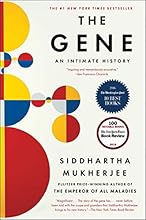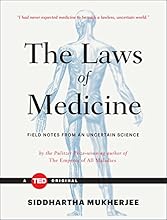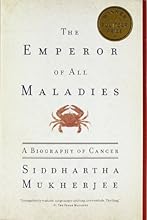Oncologist, Cancer Researcher, Award-Winning Science Writer & Pulitzer Prize-Winning Author; Co-Founder of Manas AI
Siddhartha Mukherjee Biography
Siddhartha Mukherjee is a physician, oncologist, and author who contributes to public discourse on human health, medicine, and science. He is known for his books, "The Emperor of All Maladies: A Biography of Cancer," which won him the 2011 Pulitzer Prize, and "The Gene: An Intimate History," which was recognized by The Washington Post and The New York Times as one of the most influential books of 2016. "The Emperor of All Maladies" has been adapted into a documentary by filmmaker Ken Burns and included among Time magazine’s 100 best nonfiction books of the past century.
In addition to his writing, Mukherjee is a medical scholar. His studies on the composition and behavior of cancer cells have impacted modern medicine. His research has led to the development of treatments that reach beyond current pharmaceutical models toward new biological and cellular therapies. He is an associate professor of medicine at Columbia University and a staff cancer physician at the university’s medical center. His work broadens our understanding of healing, provides hope for many patients and families globally, and has earned him recognition, including being featured in the Time 100 list of most influential people. Mukherjee writes for The New Yorker and The New York Times, and his research is published in journals such as Nature, Cell, and the New England Journal of Medicine. His work focuses on the physiology of cancer cells, immunological therapy for blood cancers, and the discovery of stem cells in the skeleton. He was awarded the Padma Shri, the fourth-highest civilian award in India, in 2014.
He has also explored the links between normal stem cells and cancer cells, investigating the microenvironment of stem cells, particularly blood-forming stem cells. Mukherjee's research has been recognized through grants from the National Institutes of Health and private foundations. His team has identified and characterized skeletal stem/progenitor cells known as OCR cells, which play a role in maintaining and repairing the skeleton. OCR cells can be transplanted into animals to regenerate cartilage and bone after fractures. Mukherjee's lab has examined the role of a high-fat, adequate-protein, low-carbohydrate diet in cancer therapy and has been involved in investigating CAR-T therapy for acute leukemia. His latest book is "The Song of the Cell," which describes the history and medical mystery of the cell and its importance in modern medicine.
In 2025, Mukherjee announced his new startup, Manas AI, alongside LinkedIn co-founder and venture capitalist Reid Hoffman. The startup will use artificial intelligence to speed up the drug discovery process, starting with treatments for aggressive cancers such as prostate cancer, lymphoma, and triple-negative breast cancer.
Contact a speaker booking agent to check availability on Siddhartha Mukherjee and other top speakers and celebrities.
Siddhartha Mukherjee Videos

Commencement 2024 - Siddhartha Mukherje Speech
Renowned physician, researcher, and best-selling author Siddhartha Mukherjee delivers his speech during the 268th Commencement on Monday, May 20th,...




-
How do I book Siddhartha Mukherjee to speak at my event?
Our experienced booking agents have successfully helped clients around the world secure speakers like Siddhartha Mukherjee for speaking engagements, personal appearances, product endorsements, or corporate entertainment since 2002. Click the Check Availability button above and complete the form on this page to check availability for Siddhartha Mukherjee, or call our office at 1.800.698.2536 to discuss your upcoming event. One of our experienced agents will be happy to help you get speaking fee information and check availability for Siddhartha Mukherjee or any other speaker of your choice. -
What are the speaker fees for Siddhartha Mukherjee
Speaking fees for Siddhartha Mukherjee, or any other speakers and celebrities, are determined based on a number of factors and may change without notice. The estimated fees to book Siddhartha Mukherjee are available upon request for live events and available upon request for virtual events. For the most current speaking fee to hire Siddhartha Mukherjee, click the Check Availability button above and complete the form on this page, or call our office at 1.800.698.2536 to speak directly with an experienced booking agent. -
What topics does Siddhartha Mukherjee speak about?
Siddhartha Mukherjee is a keynote speaker and industry expert whose speaking topics include Author, Biology, Cancer, Creativity, Disruptive Thinking, Health & Wellness, Innovation, Medicine, Non-Fiction Authors, Non-Profit, Science, Technology, TED -
Where does Siddhartha Mukherjee travel from?
Siddhartha Mukherjee generally travels from New York, NY, USA, but can be booked for private corporate events, personal appearances, keynote speeches, or other performances. For more details, please contact an AAE Booking agent. -
Who is Siddhartha Mukherjee’s agent?
AAE Speakers Bureau has successfully booked keynote speakers like Siddhartha Mukherjee for clients worldwide since 2002. As a full-service speaker booking agency, we have access to virtually any speaker or celebrity in the world. Our agents are happy and able to submit an offer to the speaker or celebrity of your choice, letting you benefit from our reputation and long-standing relationships in the industry. Please click the Check Availability button above and complete the form on this page including the details of your event, or call our office at 1.800.698.2536, and one of our agents will assist you to book Siddhartha Mukherjee for your next private or corporate function. -
What is a full-service speaker booking agency?
AAE Speakers Bureau is a full-service speaker booking agency, meaning we can completely manage the speaker’s or celebrity’s engagement with your organization from the time of booking your speaker through the event’s completion. We provide all of the services you need to host Siddhartha Mukherjee or any other speaker of your choice, including offer negotiation, contractual assistance, accounting and billing, and event speaker travel and logistics services. When you book a speaker with us, we manage the process of hosting a speaker for you as an extension of your team. Our goal is to give our clients peace of mind and a best-in-class service experience when booking a speaker with us. -
Why is AAE Speakers Bureau different from other booking agencies?
If you’re looking for the best, unbiased speaker recommendations, paired with a top-notch customer service experience, you’re in the right place. At AAE Speakers Bureau, we exclusively represent the interests of our clients - professional organizations, companies, universities, and associations. We intentionally do not represent the speakers we feature or book. That is so we can present our clients with the broadest and best performing set of speaker options in the market today, and we can make these recommendations without any obligation to promote a specific speaker over another. This is why when our agents suggest a speaker for your event, you can be assured that they are of the highest quality with a history of proven success with our other clients.
Siddhartha Mukherjee is a keynote speaker and industry expert who speaks on a wide range of topics. The estimated speaking fee range to book Siddhartha Mukherjee for your event is available upon request. Siddhartha Mukherjee generally travels from New York, NY, USA and can be booked for (private) corporate events, personal appearances, keynote speeches, or other performances. Similar motivational celebrity speakers are David Agus, Dr. Joel Selanikio, Peter Diamandis, Ray Kurzweil and Jane Fonda. Contact All American Speakers for ratings, reviews, videos and information on scheduling Siddhartha Mukherjee for an upcoming live or virtual event.
This website is a resource for event professionals and strives to provide the most comprehensive catalog of thought leaders and industry experts to consider for speaking engagements. A listing or profile on this website does not imply an agency affiliation or endorsement by the talent.
All American Entertainment (AAE) exclusively represents the interests of talent buyers, and does not claim to be the agency or management for any speaker or artist on this site. AAE is a talent booking agency for paid events only. We do not handle requests for donation of time or media requests for interviews, and cannot provide celebrity contact information.
If you are the talent and wish to request a profile update or removal from our online directory, please submit a profile request form.






























